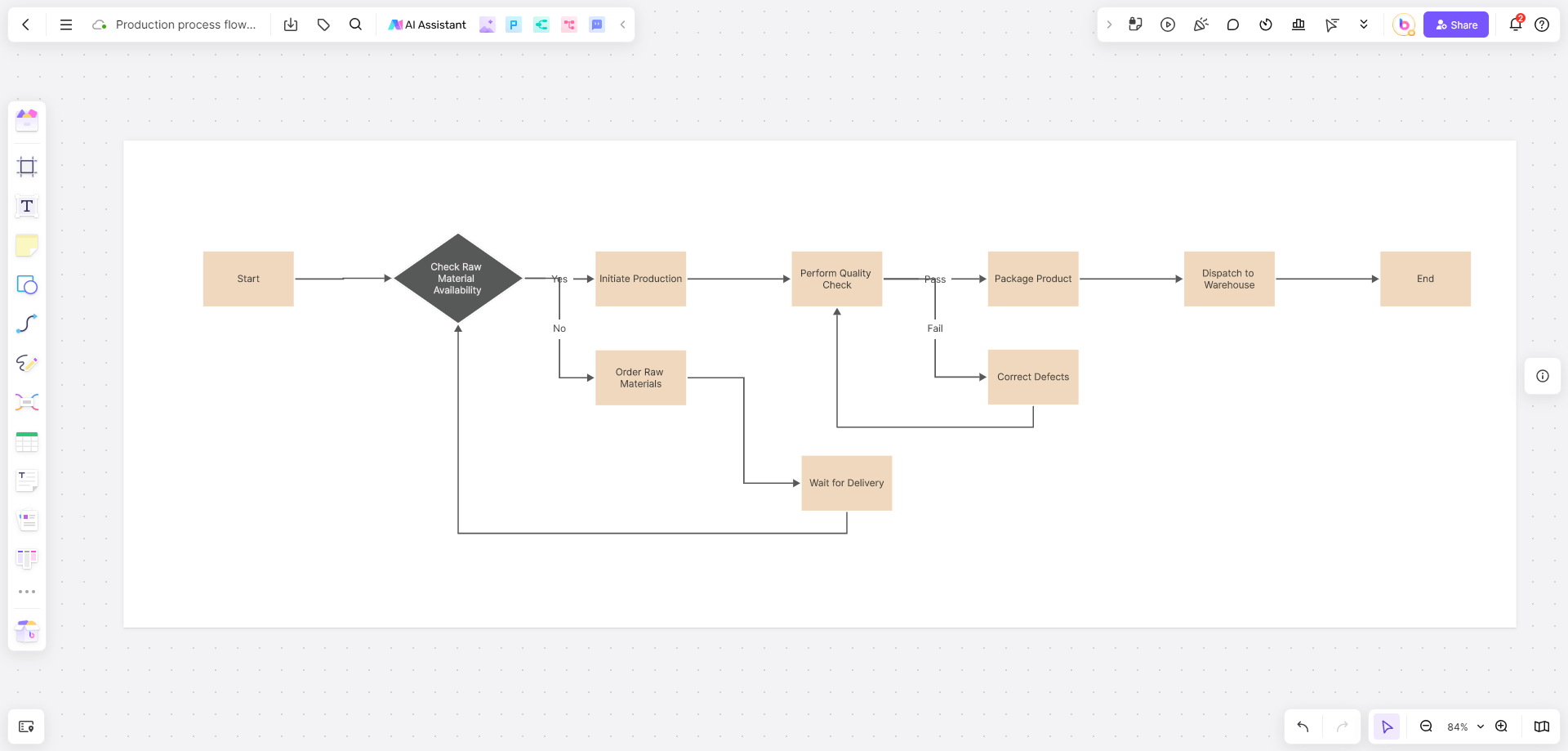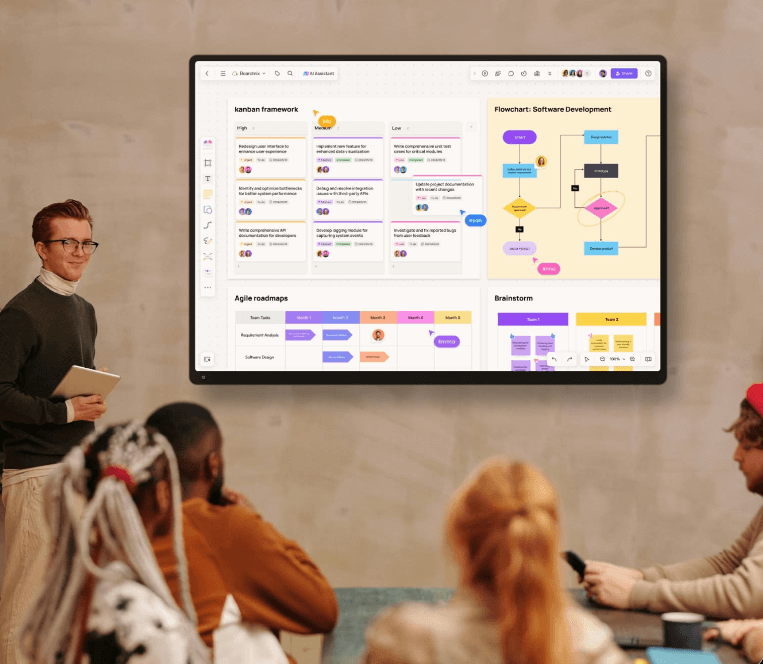Applying to school is a pivotal moment in a student's academic journey. It's a time to showcase not only your achievements but also the strengths that make you a unique and promising candidate. In this guide, we'll explore a variety of academic strengths that can enhance your school application, providing real-life examples and scenarios to help you craft a compelling and standout profile. By understanding and effectively presenting your academic strengths, you can turn your application into a powerful testament to your potential and capabilities.
What are the Academic Strengths for Students?
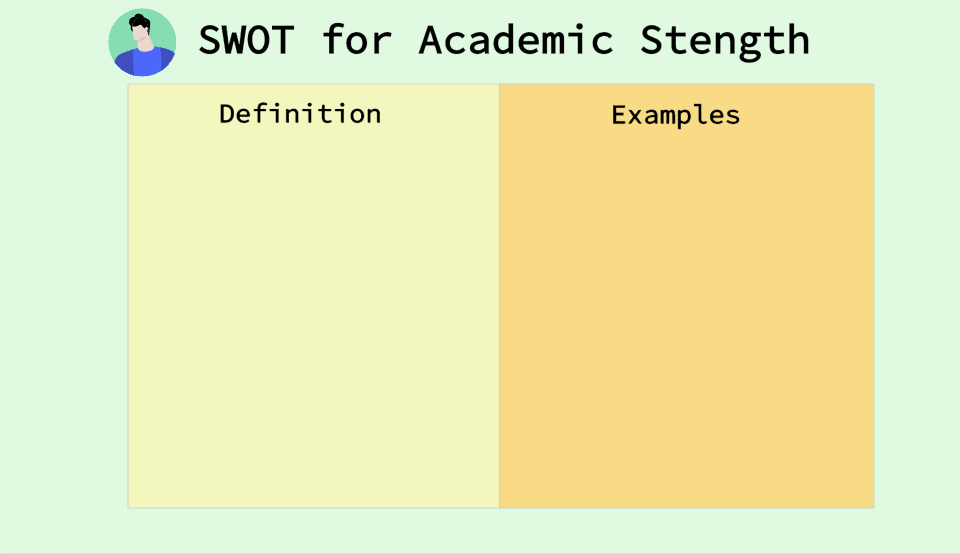
Academic strengths are the inherent abilities and skills that students possess, which contribute to their success in educational environments. These strengths can encompass a wide range of attributes, including intellectual capabilities, personal qualities, and learned skills. Recognizing and leveraging these strengths is crucial for students aiming to excel academically and stand out in school applications. Academic strengths not only highlight a student’s capabilities but also reflect their potential to contribute positively to their educational community.
Academic strengths can be broadly categorized into several areas:
Intellectual Abilities: These include cognitive skills such as critical thinking, problem-solving, analytical reasoning, and creativity. Students with strong intellectual abilities excel in understanding complex concepts, generating innovative ideas, and solving challenging problems.
Personal Qualities: Traits such as perseverance, resilience, motivation, and self-discipline fall under this category. These qualities enable students to stay focused, overcome obstacles, and maintain a positive attitude toward their studies.
Communication Skills: Effective written and verbal communication is essential for academic success. Students with strong communication skills can articulate their thoughts clearly, present ideas effectively, and engage in meaningful discussions.
Interpersonal Skills: Collaboration, teamwork, and leadership are key interpersonal skills that help students work well with others, lead group projects, and contribute positively to the classroom environment.
Examples of Academic Strengths for School Applications
When applying for schools, whether it’s for high school, college, or university, showcasing academic strengths effectively can make a significant difference. Here are some detailed examples of academic strengths that students can include in their applications:
1. Critical Thinking and Problem-Solving Skills
Critical thinking and problem-solving skills are essential for analyzing complex issues and developing innovative solutions, making them highly valued in academic settings.
Example: "In my AP Physics class, I consistently applied critical thinking and problem-solving skills to tackle complex problems. For instance, I led a group project where we designed and tested a prototype bridge, solving numerous structural challenges along the way."
2. Strong Writing and Communication Abilities
Effective communication is crucial for conveying ideas clearly and persuasively, whether in written or verbal form. Strong writing skills are particularly important for essays, reports, and presentations.
Example: "As the editor of our school newspaper, I honed my writing and communication skills. I wrote compelling articles on various topics, from school events to global issues, and worked closely with a team to ensure high-quality publication."
3. Leadership and Team Collaboration
Leadership and teamwork skills are vital for coordinating group efforts, motivating peers, and achieving collective goals. These abilities are often highlighted in extracurricular activities and group projects.
Example: "I demonstrated leadership and collaboration as the captain of the debate team. I guided our team through rigorous preparation and strategy sessions, leading us to win several regional competitions."
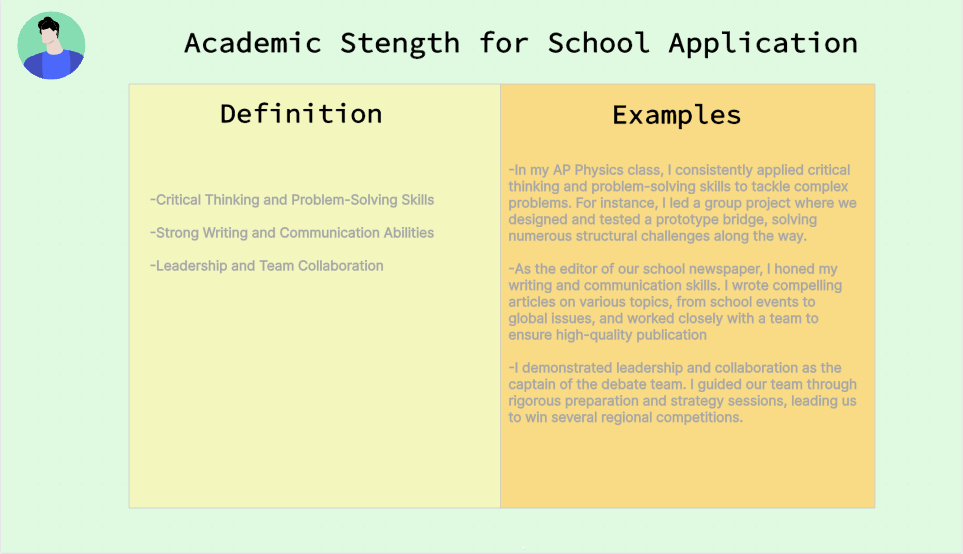
4. Scientific Inquiry and Research Skills
Research skills involve the ability to design experiments, collect and analyze data, and draw meaningful conclusions. These skills are particularly important for STEM (science, technology, engineering, and mathematics) fields.
Example: "During my internship at a local research lab, I conducted experiments and analyzed data for a study on renewable energy sources. This experience enhanced my research skills and deepened my understanding of scientific inquiry."
5. Mathematical Aptitude and Analytical Skills
Mathematical and analytical skills are essential for solving quantitative problems, interpreting data, and making logical decisions. These skills are valuable in a wide range of academic disciplines.
Example: "My strong mathematical aptitude is reflected in my consistent top scores in math competitions. Additionally, I applied analytical skills to develop a statistical model for predicting student performance in standardized tests."
6. Technological Proficiency
Proficiency in technology involves the ability to use software, hardware, and digital tools effectively. In today's digital age, technological skills are increasingly important for academic success.
Example: "I utilized my technological proficiency to develop a mobile app that helps students organize their study schedules and track their academic progress, integrating coding and project management skills."
7. Time Management and Organization
Provide an example of how you managed multiple responsibilities effectively, such as balancing schoolwork with part-time jobs or leadership roles in clubs, demonstrating your ability to stay organized and meet deadlines.
Example: "Balancing a rigorous academic schedule with extracurricular activities, I perfected my time management and organizational skills. This ability enabled me to maintain a high GPA while participating in varsity sports and volunteering."
8. Perseverance and Resilience
Share a personal story of overcoming academic or personal challenges, detailing how you persisted through difficulties and emerged stronger, demonstrating your resilience and determination.
Example: "Despite facing challenges in my sophomore year, I displayed perseverance and resilience by improving my grades through dedicated study and seeking help from teachers. This turnaround story is a testament to my commitment and determination."
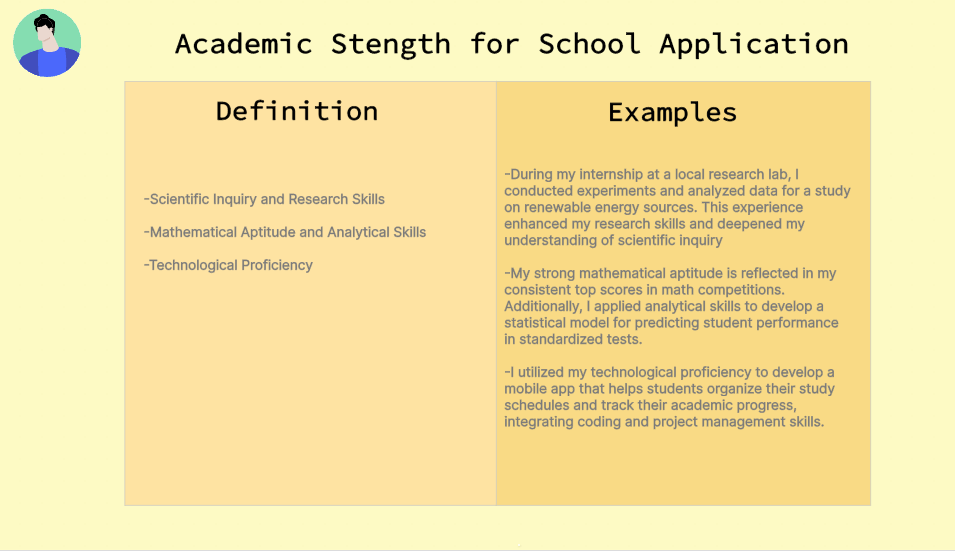
How can Students Use Academic Strength Examples to Excel in School?
Using academic strength examples strategically can greatly enhance a student’s educational journey. Here are several ways students can utilize these strengths to excel in school:
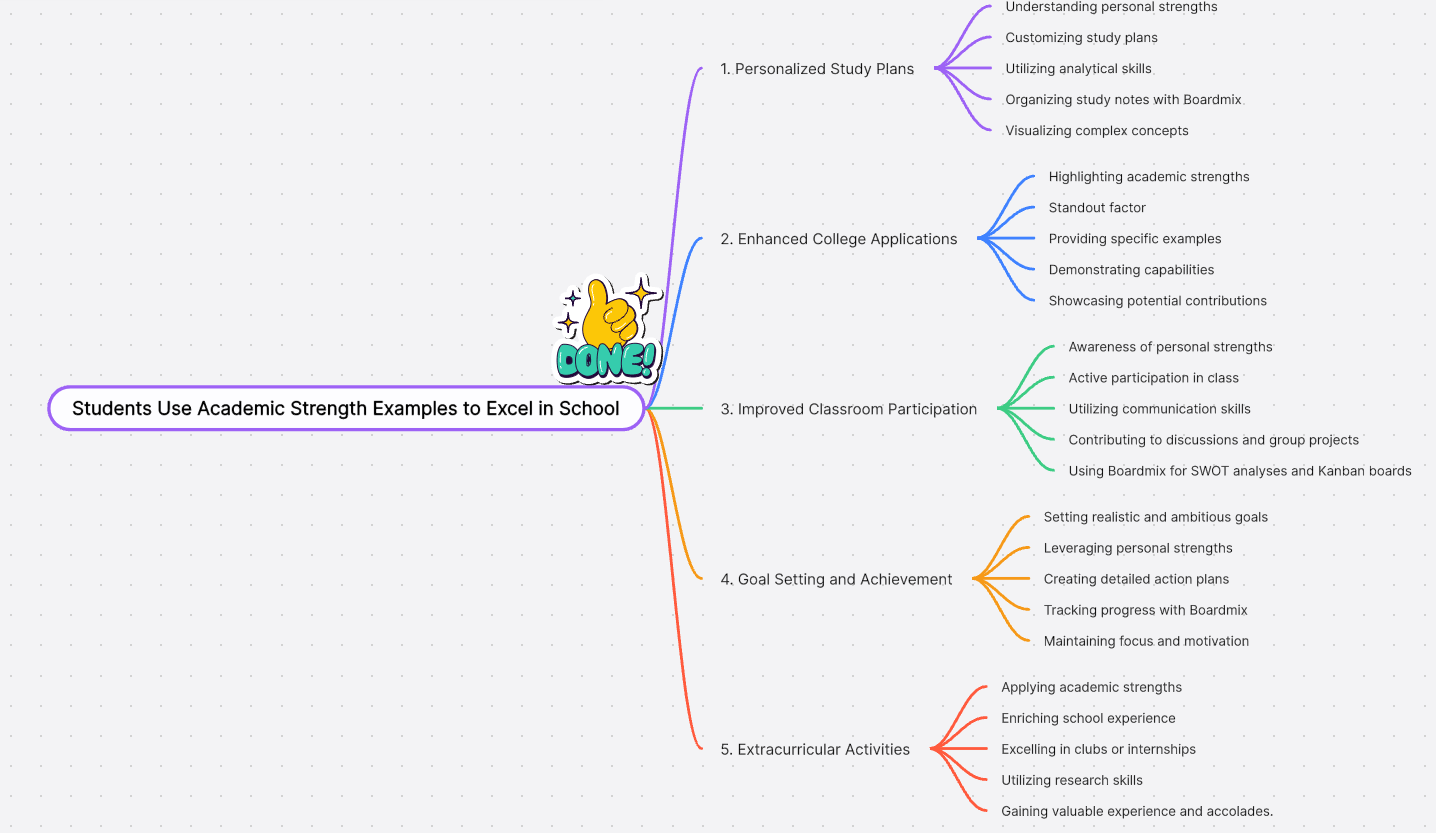
1. Personalized Study Plans
By identifying and understanding their strengths, students can create personalized study plans that cater to their unique abilities. For instance, a student with strong analytical skills might focus on subjects that require critical thinking, using Boardmix to organize their study notes and visualize complex concepts.
2. Enhanced College Applications
Highlighting academic strengths in college applications can make a student stand out. By providing specific examples, such as leadership roles or innovative projects, students can demonstrate their capabilities and potential contributions to the academic community.
3. Improved Classroom Participation
Students who are aware of their strengths are more likely to participate actively in class. For example, a student with excellent communication skills can contribute to class discussions and group projects, enhancing their learning experience and building a positive classroom presence. Students can use Boardmix to create related Kanban boards, SWOT analyses, and other templates to analyze the strengths of and apply school.
4. Goal Setting and Achievement
Students can set realistic and ambitious academic goals by leveraging their strengths. Utilizing tools like Boardmix, they can create detailed action plans and track their progress, ensuring they stay focused and motivated.
5. Extracurricular Activities
Academic strengths can also be applied to extracurricular activities, enriching a student’s overall school experience. For instance, a student with strong research skills might excel in science clubs or research internships, gaining valuable experience and accolades.
Why Should You Continuously Assess and Develop Academic Strengths?
Continuously assessing and developing academic strengths is vital for long-term success. Here are some reasons why this practice is beneficial:
1. Adaptability to Change
The academic landscape is constantly evolving, with new challenges and opportunities arising. By regularly assessing their strengths, students can adapt to changes and remain competitive.
2. Personal Growth and Development
Continuously developing academic strengths fosters personal growth. Students who actively work on enhancing their abilities are more likely to achieve their full potential and experience a sense of accomplishment.
3. Increased Confidence and Motivation
Recognizing and developing strengths boosts confidence and motivation. Students who are aware of their capabilities are more likely to take on challenging tasks and pursue ambitious goals.
4. Career Preparation
Developing academic strengths is crucial for career preparation. The skills and abilities honed during academic years often translate into professional success, making students better equipped for their future careers.
5. Academic Excellence
Ultimately, continuously assessing and developing academic strengths leads to academic excellence. Students who are committed to self-improvement are more likely to achieve high grades, gain scholarships, and receive recognition for their efforts.
Academic strengths are a cornerstone of student success, playing a critical role in school applications and overall academic performance. By understanding and leveraging their strengths, students can create personalized study plans, enhance their college applications, and excel in classroom and extracurricular activities. Tools like Boardmix can assist in visualizing and organizing these strengths, ensuring that students make the most of their abilities. Continuously assessing and developing these strengths is essential for adaptability, personal growth, and long-term success. Embracing and nurturing academic strengths not only paves the way for academic excellence but also prepares students for future career achievements.





